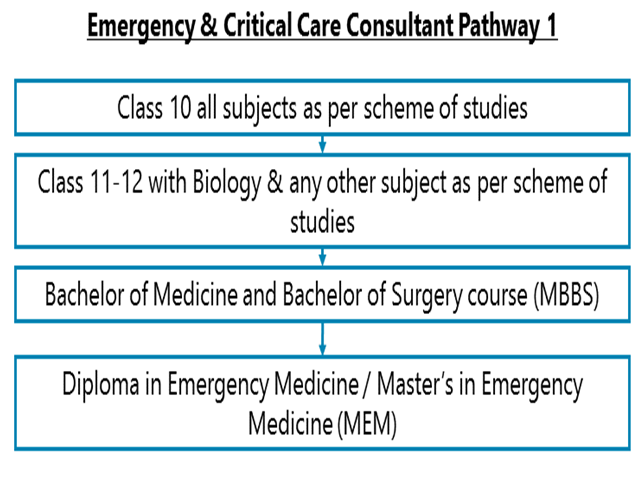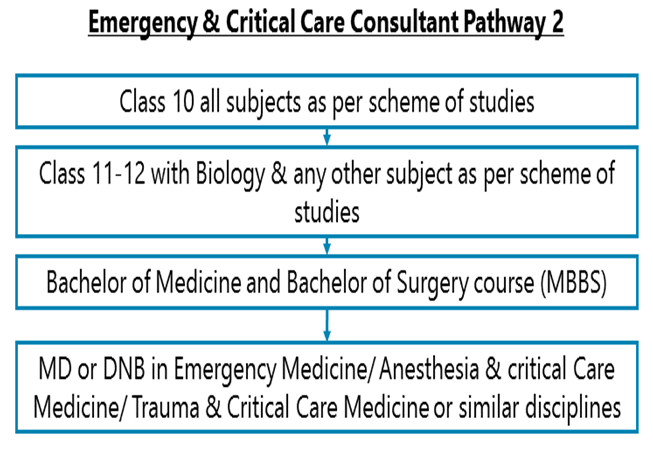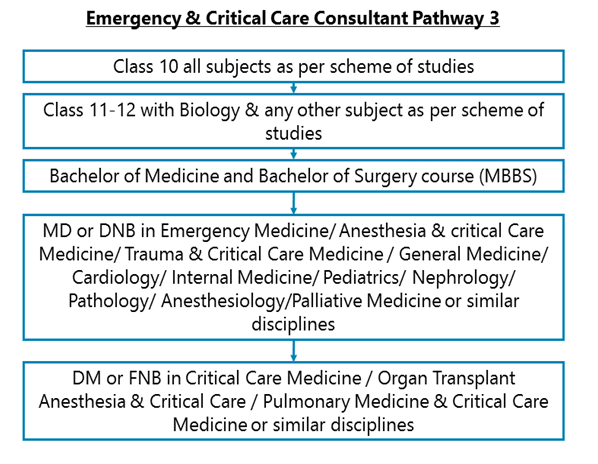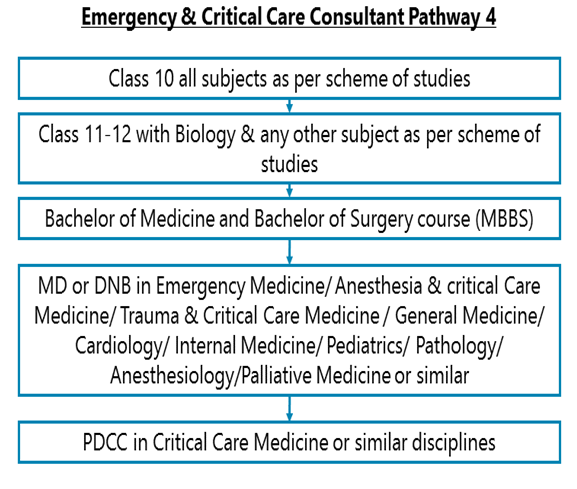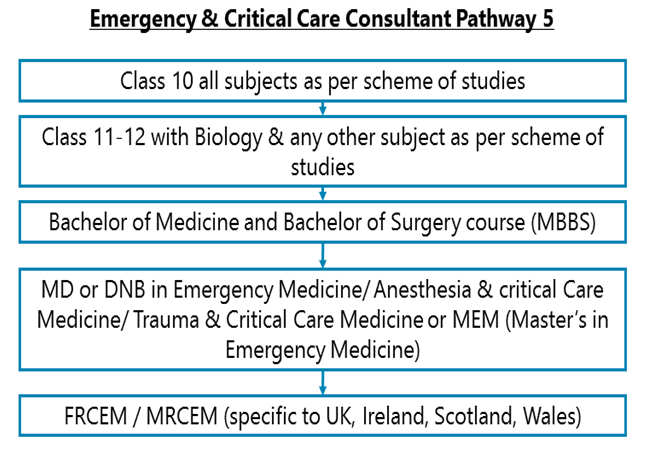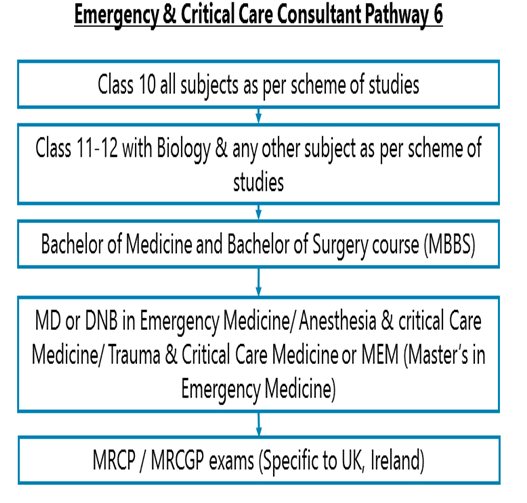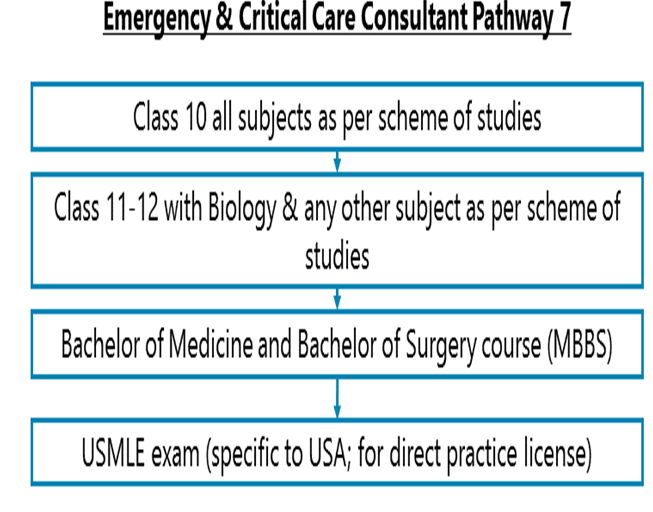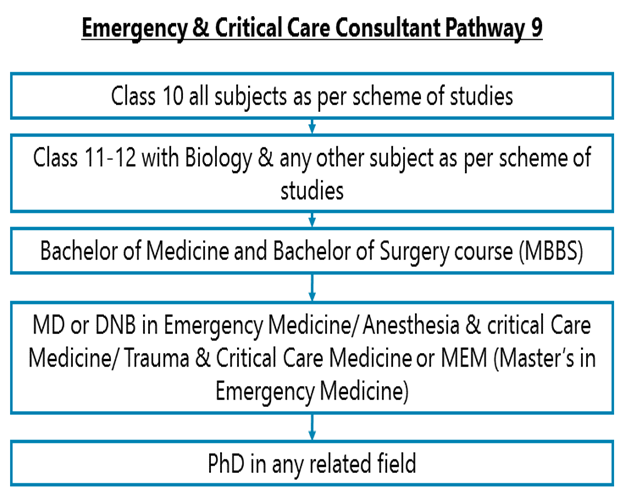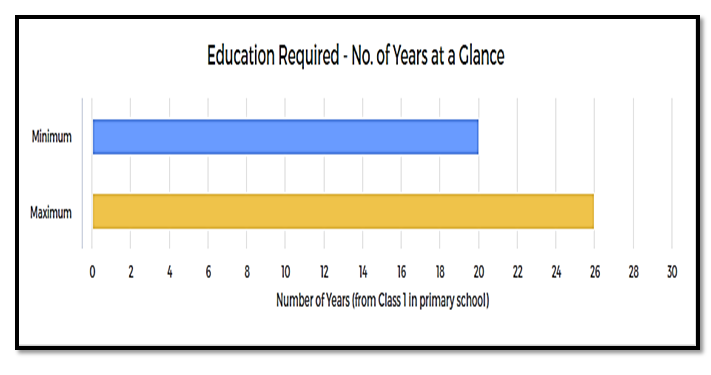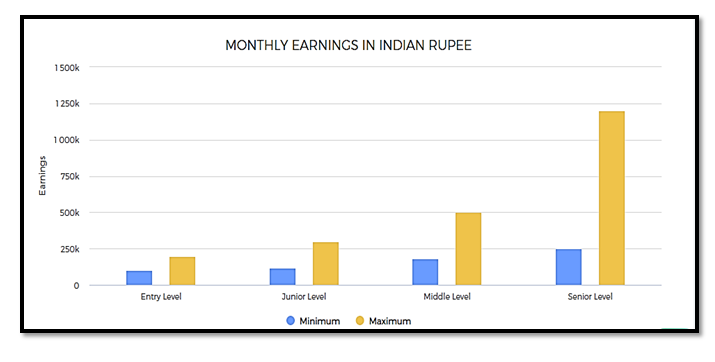Emergency & Critical Care Consultant
Entry Level Qualification
12
Career Fields
Medical Services
For Specially Abled



About Career
PARTICULARS | DESCRIPTION |
Name | Emergency & Critical Care Consultant |
Purpose | Provide Urgent and Intensive Medical Care |
Career Field | Allied & Para Medical Science |
Required Entrance Exam | NEET UG, NEET PG, AIIMS PG INICET |
Average Salary | 12,00,000 - 20,00,000 Rs. Per Year |
Companies For You | trauma centers, Hospitals, Emergency Care Centers & Many More |
Who is Eligible | Graduate |
Emergency & Critical Care Consultants are super-specialist doctors who provide specialized care by advising medication & treatment strategies for people with acute clinical & medical needs, as well as those who have experienced major surgery or trauma. Emergency & Critical Care for patients is irrespective of age, gender, underlying diagnosis, medical specialty, or location in the hospital.
Patients with conditions such as sepsis, pneumonia, hemorrhage, peritonitis (bacterial infection either via the blood or after rupture of an abdominal organ), cancer, stroke, accidental injuries, heart attacks, cerebral attacks, asthma, organ failure, and acute respiratory blockage can all have or develop critical illness and need emergency medical care. A “critical illness” may include any immediately life-threatening, reversible condition.
The primary focus of Emergency & Critical Care
1. Emergency &Critical Care focuses on resuscitating unstable patients and allowing time for recovery or the effect of specific therapies to improve outcomes and prevent death. Emergency &Critical Care is therefore for patients who are critically ill upon arrival in a hospital, or hospitalized patients who were stable and subsequently deteriorated.
2. Emergency & Critical Care can be provided anywhere in the hospital: in the emergency departments, general intensive Care Units(ICUs), post-operative recovery units, as well as high-dependency units, trauma care departments and all other types of Critical Care Units like Pediatric Intensive Care Units (PICU), CCUs (Cardiac Critical Care units), CICUs (Cardiac Intensive Care Unit) etc.
Emergency & Critical Care Consultants cater to
1. Patients needing emergency attention, most commonly including those with chest pain, respiratory problems, occupational injuries, sprains & fractures, drug overdoses, asthma attacks, severely traumatic allergic reactions causing disfiguration of the face etc., abdominal pain, injuries from motor vehicle accidents, seizure disorders, cardiac arrhythmia (the abnormal rhythm of the heartbeat) and ocular (eye) injuries. On average, 20% of emergency department patients are children.
2. Critically ill patients include those who have experienced major surgery or trauma. They need advanced monitoring & care, and often coronary, respiratory or nephrological life support systems too. Critically ill patients will include those experiencing a range of conditions, like multisystem organ failure (such as kidney & liver failure), sepsis (infection after surgery or from a bruise, etc.), respiratory failure, central nervous system crises and cardiac failure.
Emergency & Critical Care specialists provide on the spot diagnosis
1. Emergency & Critical Care specialists provide crucial emergency medical care to patients who need on the spot diagnosis. They are involved in the management of patients with sudden life-threatening but reversible complex medical & surgical illnesses in Intensive Care Units (ICU), Coronary Care Units, Emergency Department Intensive Care Units(ED-ICUs) or Operation Theatres (OT). “Intensivist” is another name for a specially trained critical care medical professional.
2. Critical illness results in millions of deaths each year. Emergency & Critical Care involves caring for the most seriously ill or injured patients including those who are in desperate need of mechanical ventilation, are suffering from respiratory distress or need coronary support.
Emergency & Critical Care Consultants have to routinely work closely with other doctors
1. Care for those with critical illness is often neglected due to a lack of prioritization, coordination, and coverage of timely identification and basic life-saving treatments. Emergency & Critical Care Consultants have to work with doctors from many specialties, including anesthesiology, internal medicine, pulmonary medicine, cardiovascular medicine, cardiovascular surgery, neurosurgery and neurology.
2. They also collaborate with experts from disciplines like nephrology, pediatrics, surgery and transplant medicine. Together, a collaborative co-managed team provides high-quality & safe critical care in operating rooms, ICUs and similar hospital settings to the most seriouslyill as well as those needing urgent medical attention.
Key Roles and Responsibilities
1. You will manage& treat patients (children, adolescents, adults & the elderly) needing emergency attention & on the spot diagnosis. This involves caring for patients with sudden chest pain, cardiac problems, nephrological or kidney-related problems, occupational injuries, sprains & fractures or various other life-threatening complications.
2. You will care for critically ill patients including those who have experienced major surgery/trauma as well as those who are in desperate need of mechanical ventilation, are suffering from respiratory distress or need coronary support.
3. You will be examining a patient (physical examination and primary screening) for diagnosis of and obtaining information on medical / physical conditions, history, and tendencies to ascertain necessary medical attention or required surgical procedures.
4. You will be diagnosing bodily disorders and clinical conditions and suggest therapeutic treatments, such as administering internal medicine, mobilizing life support systems or suggesting necessary surgeries, in Intensive Care Units (ICU), Coronary Care Units or Operation Theatres (OT).
5. You will analyze records, reports, test results, or examination information to diagnose the medical condition of a patient.
6. You will advise a surgeon of a patient's risk status and recommend appropriate intervention to minimize risk.
7. You will explain procedures and discuss test results or prescribed treatments with patients.
8. You will be involved in recording patient’s condition or progress throughout the tenure of your treatment sessions, writing reports and maintaining proper registers containing patient information (case histories).
9. You will provide& manage long-term, comprehensive medical care, including diagnosis and nonsurgical treatment of diseases, to patients with a variety of clinical conditions including but not limited to pulmonary/ respiratory, cardio logical, nephron logical (kidney), hematological (liver) and neurological complications.
Career Entry Pathway
Class 10 all subjects as per scheme of studies – Class 11-12 with Biology & any other subject as per scheme of studies – MBBS – Diploma in Emergency Medicine / Master’s in Emergency Medicine (MEM)
After completing Class 11-12 with Biology & any other subject as per scheme of studies , you must do a Bachelor degree in Medicine (MBBS). Then go for a Diploma in Emergency Medicine / 3 year Master’s in Emergency Medicine (MEM).
Class 10 all subjects as per scheme of studies – Class 11-12 with Biology & any other subject as per scheme of studies – MBBS – MD or DNB in Emergency Medicine/ Anesthesia & critical Care Medicine/ Trauma & Critical Care Medicine or similar disciplines
After completing Class 11-12 with Biology & any other subject as per scheme of studies , you must do a Bachelor degree in Medicine (MBBS). Then go for MD or DNB in Emergency Medicine/ Anesthesia & critical Care Medicine/ Trauma & Critical Care Medicine or similar disciplines.
Class 10 all subjects as per scheme of studies – Class 11-12 with Biology & any other subject as per scheme of studies – MBBS – MD or DNB in Emergency Medicine/ Anesthesia & critical Care Medicine/ Trauma & Critical Care Medicine / General Medicine/ Cardiology/ Internal Medicine/ Pediatrics/ Nephrology/ Pathology/ Anesthesiology/Palliative Medicine or similar disciplines – DM or FNB in Critical Care Medicine / Organ Transplant Anesthesia & Critical Care / Pulmonary Medicine & Critical Care Medicine or similar disciplines
After completing Class 11-12 with Biology & any other subject as per scheme of studies , you must do a Bachelor degree in Medicine (MBBS). After an MBBS, you should do an MD or DNB in Emergency Medicine/ Anesthesia & critical Care Medicine/ Trauma & Critical Care Medicine / General Medicine/ Cardiology/ Internal Medicine/ Pediatrics/ Nephrology/ Pathology/ Anesthesiology/Palliative Medicine or similar disciplines, then you should do a super specialization in Pulmonary Medicine. In India, the option for super-specialization is doing a DM or FNB in Critical Care Medicine / Organ Transplant Anesthesia & Critical Care / Pulmonary Medicine & Critical Care Medicine. In Medicine, MD is said to be a Doctor in Medicine program and a DM is said to be a Doctorate in Medicine program. In India, after a DNB the option is doing an FNB (Fellow of National Board), which is of 3 years duration. Both DNB & FNB are practice based programs, for which you should be working at a concerned department at a super speciality hospital. You will have to first qualify in the DNB entrance examination (called DNB CET), then work at a hospital. Once the designated period of practice is completed, you will have to appear in the DNB final examination. Similarly, for getting into a Fellowship program, you must first qualify in the Fellowship entrance examination.
Class 10 all subjects as per scheme of studies – Class 11-12 with Biology & any other subject as per scheme of studies – MBBS – MD or DNB in Emergency Medicine/ Anesthesia & critical Care Medicine/ Trauma & Critical Care Medicine / General Medicine/ Cardiology/ Internal Medicine/ Pediatrics/ Pathology/ Anesthesiology/Palliative Medicine or similar – PDCC in Critical Care Medicine or similar disciplines
After completing Class 11-12 with Biology & any other subject as per scheme of studies , you must do a Bachelor degree in Medicine (MBBS). After an MBBS, you should do a 3-year MD or DNB in Emergency Medicine/ Anesthesia & critical Care Medicine/ Trauma & Critical Care Medicine / General Medicine/ Cardiology/ Internal Medicine/ Pediatrics/ Pathology/ Anesthesiology/Palliative Medicine or in similar disciplines. Thereafter, go for PDCC in Critical Care Medicine or similar disciplines. PDCC is Post-Doctoral Certificate Course which can be done after MD/ DNB.
Class 10 all subjects as per scheme of studies – Class 11-12 with Biology & any other subject as per scheme of studies– MBBS – MD or DNB in Emergency Medicine/ Anesthesia & critical Care Medicine/ Trauma & Critical Care Medicine or MEM (Master’s in Emergency Medicine) – FRCEM / MRCEM (specific to UK, Ireland, Scotland, Wales)
After completing Class 11-12 with Biology & any other subject as per scheme of studies , you need to finish your graduation with a MBBS degree. Then go for MD or DNB in Emergency Medicine/ Anesthesia & critical Care Medicine/ Trauma & Critical Care Medicine or MEM (Master’s in Emergency Medicine) program. Thereafter, clear FRCEM Part A or Primary exam to be a Fellow of the Royal College of Emergency Medicine (RCEM), London. Further details are in the Education Requirements section. There are 2 more parts FRCEM Part B/C to obtain Membership of the RCEM, London.
Class 10 all subjects as per scheme of studies – Class 11-12 with Biology & any other subject as per scheme of studies – MBBS - MD or DNB in Emergency Medicine/ Anesthesia & critical Care Medicine/ Trauma & Critical Care Medicine or MEM (Master’s in Emergency Medicine)– MRCP / MRCGP exams (Specific to UK, Ireland)
After completing Class 11-12 with Biology & any other subject as per scheme of studies, you need to finish your graduation with a MBBS degree. Then you must acquire anMD or DNB in Emergency Medicine/ Anesthesia & critical Care Medicine/ Trauma & Critical Care Medicine or go for a MEM (Master’s in Emergency Medicine) program. After MD or DNB and while you are practicing, go for MRCP (Membership of the Royal Colleges of Physicians) / MRCGP (Membership of the Royal College of General Practitioners) certifications in Emergency or Critical Care Medicine. These exams are conducted in India at various locations.
Class 10 all subjects as per scheme of studies – Class 11-12 with Biology & any other subject as per scheme of studies - MBBS - USMLE exam
After completing Class 11-12 with Biology & any other subject as per scheme of studies , you need to finish your graduation with a MBBS degree. While you are completing your MBBS degree, you will have to decide whether you want to obtain further education in the US or practice directly there. If you want to practice directly, you will have to start preparing for USMLE exam (United States Medical Licensing Examination) from your 3rd year itself, if not earlier. There are 3 parts to it – Step 1, Step 2 CK (Clinical Knowledge) and Step 3 CS (Clinical Skills).
Class 10 all subjects as per scheme of studies – Class 11-12 with Biology & any other subject as per scheme of studies – MBBS – MCAT – 4-year MD in US - USMLE exam (specific to USA)
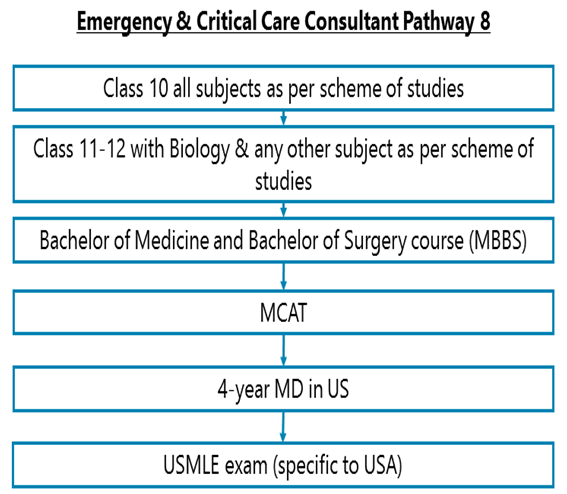
After completing Class 11-12 with Biology & any other subject as per scheme of studies, you need to finish your graduation with a MBBS degree then appear for MCAT. While you are completing your graduation degree, you will have to decide whether you want to obtain further education in the US or practice directly there. If you want to study further and then practice medicine in the US, you will have to first appear for the MCAT exam and finish the 4 year MD course there (equivalent to MBBS in India). In US, all courses after MD involves Residency and generally one does not get any more degree but obtain Fellowships after residencies. After your MD (medical degree) from an American medical college, you will have to appear for USMLE to obtain licensure for practicing as a medical professional in the US and start with a residency there.
Class 10 all subjects as per scheme of studies – Class 11-12 with Biology & any other subject as per scheme of studies – MBBS - MD or DNB in Emergency Medicine/ Anesthesia & critical Care Medicine/ Trauma & Critical Care Medicine or MEM (Master’s in Emergency Medicine) – PhD in any related field
After completing Class 11-12 with Biology & any other subject as per scheme of studies, you need to finish your graduation course in medicine (MBBS). Then you must acquire an MD or DNB in Emergency Medicine/ Anesthesia & critical Care Medicine/ Trauma & Critical Care Medicine or go for a MEM (Master’s in Emergency Medicine) program. Thereafter, go for doctoral studies or a PhD along similar lines of your discipline.
Required Qualification & Competencies
1. After Class 11-12 with Physics, Chemistry, and Biology along with any other subject as per scheme of studies, you must study for a Bachelor of Medicine and Bachelor of Surgery (MBBS) degree. Various forms of this qualification’s name are MB ChB, MB BChir, BM BCh, BMBS and MB BCh around the globe.
2. After your graduation, you can study for a Diploma in Emergency Medicine (DEM) or post graduate level degree like MEM (Master’s in Emergency Medicine), MD or DNB, or an equivalent qualification and complete junior residencies to specialize in various branches of Medicine.
DNB is considered equivalent to MD. The only difference is for MD you will be trained in government medical colleges or teaching hospitals whereas for DNB you will be trained mostly at private teaching/ non-teaching hospitals (with at least 500 beds).
3. After postgraduation (MD/DNB), you may complete senior residencies and obtain aDM /FNB (Fellow of National Board).This is not possible after a post-graduate Diploma level qualification like DEM.
4. You can obtain a PhD after MDif you want to pursue a career only in medical research. Otherwise, all physicians with MD/ DNB or DM/ FNB or equivalent & higher qualifications may also publish scientific research studies in journals without a PhD.
In the UK, MRCP/ MRCGP/FRCEM/ MRCEM certification is mandatory to practice as an Emergency / Critical Care Consultant and take full GMC (General Medical Council) registration.
1. You have to qualify for a graduation from any medical school (in UK or any other country including India), complete MD(if you are studying in India) and obtain your MRCP qualification from any of the Royal Colleges (Edinburgh, Glasgow, London) or your MRCGP certificate from the Royal College of General Practitioners or a Fellowship/ Membership from the Royal College of emergency Medicine.
2. There are 3 Royal Colleges that grant MRCP certifications: in Edinburgh, Glasgow and London. MRCP is conducted by each college separately. So, there are 3 different MRCP exams by 3 different colleges. Each exam has its own format that can be referred to from respective portals of conducting bodies.
3. MRCGP South Asia program is run by the Indian Medical Association only in Chennai. For appearing for MRCGP certification you should have minimum of 5 years clinical experience of which a minimum of 3 years should be in General Practice.
4. FRCEM/ MRCEM exams are conducted by the Royal College of Emergency Medicine. For a Fellowship with the RCEM (FRCEM), you are to clear FRCEM Part A / Primary exam. To obtain Membership (MRCEM), you are to clear all 3 parts i.e. Part A/B/C (Primary, Intermediate and Final exams).
If You Are Targeting US or Canada,
1. Remember, you will have to clear USMLE after you complete an MBBS program in India to be able to directly practice in the US. To study in medical schools in USA or Canada for an MD degree before practicing there, you will have to clear MCAT. Medical College Admission Test (MCAT) is a compulsory test for anyone who plans to get admission in medical schools of USA and Canada. MD degrees are followed by 3 to 7 years of residency. Graduates can practice any specialty. Physicians are fully certified after passing board exams.152 MD-granting schools are in the United States and 17 are in Canada.
2. MCAT consists for 4 distinct sections which are individually scored. Each section is allotted either 90 or 95 minutes and tests between 50 and 60 questions. Including breaks, the full examination lasts approximately 7.5 hours.
3. Most MBBS graduates go for further study by passing MCAT, completing 4- year MD in US or Canada and then appearing for USMLE because this way is easier. However, some MBBS graduates avoid this path and directly aim at USMLE from India but cannot succeed as they lack US-based education which is extremely essential in order to pass USMLE.
4. MCAT is administered 25 times in a year. With a pass in MCAT, they will need to complete a medical degree (MD) in the US or Canada which is for 4 years. Then they can appear for USMLE and get a practice license.
5. Remember: after passing USMLE once, you cannot repeat it for attempting a better score. Programs usually eliminate candidates with multiple attempts. For this reason, it is essential to do extremely well in the first attempt. Further, your answers will not be evaluated on a population curve basis; you will be marked on the level of difficulty of the items you have attempted during the examination.
6. Graduates from any other biological/ allied medical discipline in India (other than MBBS) are also eligible to practice as a Medical Professional in the US but they have to appear for MCAT with a ‘special permission ‘from Association of American Medical Colleges (AAMC) (before registering for the exam, mail to mcat@aamc.org stating the reasons why you wish to take the exam). If you are specially permitted by AAMC, which is rare, you can then attempt & clear MCAT, then pass 4-year MD, then clear USMLE and then practice in US / Canada.
So, in short
MBBS in India > MCAT > Basic Medical Degree in US / Canada (MD) > USMLE > Practice
Alternatively, a tougher route is,
MBBS in India > USMLE > Practice
For non-medical graduates from India,
Bachelor degree (duration is not a factor) > MCAT with special permission>Basic Medical Degree in US / Canada (MD) > USMLE >Practice
MINIMUM EDUCATION REQUIRED | MAXIMUM EDUCATION REQUIRED |
Under Graduate Undergraduate Degree / Honours Diploma / Graduate Diploma (equivalent to a Degree) Programs for which the minimum eligibility is a pass in Higher Secondary / Class XII School Leaving examination. | Post-Doctoral Post Ph.D. programs for which the minimum eligibility is a Doctoral degree. |
Competencies Required
Interests
1. You should have interests for Investigative Occupations. Investigative occupations involve working with ideas and quite a lot of thinking, often abstract or conceptual thinking. These involve learning about facts and figures; involve use of data analysis, assessment of situations, decision making and problem solving.
2. You should have interests for Realistic Occupations. Realistic occupations involve more practical and hands-on activities than paperwork or office work. Realistic occupations often involve physical activities for getting things done using various tools and equipment.
3. You should have interests for Social Occupations. Social occupations involve helping or assisting others; these involve working with and communicating with people to provide various services; these may involve educating and advising others.
Knowledge
1. You should have knowledge of Medicine - the science of diagnosis, treatment and prevention of human diseases, ailment, injuries and disorders. This includes understanding the symptoms, knowledge of the diagnostic processes, knowledge of the treatment procedures and medicines, and preventive healthcare measures.
2. You should have knowledge of Healthcare Science and Services - different fields which are related to offering various types of healthcare services to people; assisting physicians and surgeons to carry out diagnosis, treatment and prevention of human diseases, ailment and disorders. This includes knowledge of different practices apart from medicine which are used to treat and prevent human diseases or to provide holistic healthcare and wellness. This also includes knowledge about drugs and medicines.
3. You should have knowledge of Biological Sciences - humans, their anatomical structure, cell structure, tissues, physiological functions, evolution, and all other related aspects.
Skills
1. You should have Active Listening Skills - Giving full attention to what other people are saying, understanding the points being made by others, asking questions, etc.
2. You should have Critical Thinking skills- Skills in the analysis of complex situations, using logic and reasoning to understand the situations and take appropriate actions or make interpretations and inferences.
3. You should have Reading Comprehension Skills - Skills in understanding written sentences and paragraphs in work-related documents.
4. You should have Instruction Skills - training others how to do something.
5. You should have Judgment and Decision Making Skills - considering pros and cons of various decision alternatives; considering costs and benefits; taking appropriate and suitable decisions.
6. You should have Problem Solving Skills - Skills in analysis and understanding of problems, evaluating various options to solve the problems and using the best option to solve the problems.
7. You should have Persuasion Skills- persuading others to change their minds or behaviour.
Ability
1. You should have Oral Comprehension Ability - listen to and understand information and ideas presented through spoken words and sentences.
2. You should have Oral Expression Ability - communicate information and ideas in speaking so others will understand.
3. You should have Deductive Reasoning Ability - apply general rules and common logic to specific problems to produce answers that are logical and make sense. For example, understanding the reasons behind an event or a situation using general rules and common logic.
4. You should have Problem Sensitivity - The ability to tell when something is wrong or is likely to go wrong. It does not involve solving the problem, only recognizing there is a problem.
5. You should have Inductive Reasoning Ability - The ability to combine pieces of information from various sources, concepts, and theories to form general rules or conclusions. For example, analysing various events or situations to come out with a set of rules or conclusions.
6.You should have Near Vision - The ability to see details at close range (within a few feet of the observer).
7. You should have Perceptual Speed - The ability to quickly and accurately compare similarities and differences among sets of letters, numbers, objects, pictures, or patterns. The things to be compared may be presented at the same time or one after the other. This ability also includes comparing a presented object with a remembered object.
8. You should have Arm-Hand Steadiness - The ability to keep your hand and arm steady while moving your arm or while holding your arm and hand in one position.
Personality Traits
1. You are always or mostly careful about your actions and behaviour.
2. You are always or mostly disciplined in your action and behaviour.
3. You are always or mostly a soft-hearted person.
4. You are always or mostly helpful to others.
5. You are always calm or generally remain calm in most situations.
6. You can always act independently or could do so in most situations.
Career - Job Opportunities & Profiles
In India, after an MD in the broad specialty of Emergency Medicine, Anesthesia & Critical Care Medicine or Trauma & Critical Care Medicine or in similar disciplines or after completing a DM/ FNB (remuneration will obviously differ) you may get a job as an Emergency / Critical Care Medicine Consultant in any of the following healthcare establishments:
1. Multi-Specialist Government and private hospitals such as All India Institute of Medical Sciences (AIIMS), Christian Medical College& Hospital, Apollo, Fortis, Narayana, Kasturba, Tata, Lilavati, Medanta, Kokilaben, King Edward Memorial, Max, Wockhardt, Sterling, Shalby, Medica, King George, Assam Medical College, Columbia Asia, Jaslok, AMRI, and so on.
2. You may also pursue clinical practice and advise patients at various health clinics.
3. Most jobs for Specialist Consultant Physicians are contractual. Many of the Consultants work in more than one hospital.
4. If you want to pursue a career in teaching along with practice(practice means you will be involved in treating patients), you may join a teaching hospital as an Associate Professor, generally referred to as Medical College and Hospital such as the AIIMS, St. John, Kasturba Medical College, Maulana Azad Medical College, King George’s Medical College, Christian Medical College Vellore, Grant Medical College, Calcutta Medical College, Lady Hardinge Medical College, etc.
5. If you want to pursue a career in Medical Research along with practice(practice means you will be involved in treating patients), then you may join any of the medical colleges which are involved in research such as the AIIMS, JIPMER Pondicherry, Institute of Medical Sciences, BHU, University College of Medical Science, Delhi University, Sri Ramachandra Medical College & Research Institute, Regional Medical Research Centre at Bhubaneswar and Dibrugarh, PGIMER, Chandigarh, IPGMER at Kolkata, etc.
Career Growth
1. In hospitals, if you are engaged as a practicing Consultant, there is no growth as such in terms of job positions, except being called a Senior Consultant. However, in teaching hospitals, if you are engaged in teaching along with practice, you may grow from an Associate Professor’s role to a Professor and then to a ‘Senior Professor’ and then ‘Professor & Head’.
2. If you are engaged at a medical research institution, you may grow from the position of a Senior Scientist to that of a Principal Scientist, then to a Deputy Director and Director.
Salary Offered
1. Remember that by the time you complete a DM, you will have at least 8 years of practice experience, first as a junior resident (3 years during MD), then as a senior resident (3 years during DM) and considering 1 year gaps between MBBS and MD and then another 1-year gap between MD and DM).
2. In most cases, however, it takes at least 10 years to complete a DM. If you intend to stop with an MD in Emergency Medicine, Anesthesia & Critical Care Medicine or Trauma & Critical Care Medicine or in similar disciplines without going further for a DM, you may expect your remuneration to be slightly lower than below figures.
3. After your DM, as a super-specialist Emergency / Critical Care Medicine Consultant, you will be getting about Rs. 1, 00,000-1, 30,000 a month to begin with at a Government hospital.
4. At a private hospital, you may get about Rs. 1, 50,000-2, 00,000 or even more a month depending upon your experience.
5. With about 2-5 years post qualification experience (after DM), you will be making about Rs. 1, 20,000 – 3, 00,000 or more per month.
6. With about 6-12 years post qualification experience (after DM), you will be making about Rs. 1, 80,000 – 5, 00,000 or more per month.
7. Senior Specialist Consultants with about 15-20+ years post qualification experience (after DM), you will be making about Rs. 2, 50,000 – 12, 00,000 or more per month.
Monthly Earning In Indian Rupee
Entry Level | Junior Level | Mid Level | Senior Level | |||||
Min Earning | Max Earning | Min Earning | Max Earning | Min Earning | Max Earning | Min Earning | Max Earning | |
100000 | 200000 | 120000 | 300000 | 180000 | 500000 | 250000 | 1200000 | |
1. Entry level: 0 - 2 years of work experience
2. Junior Level: From 1 to 12 years of work experience
3. Mid Level: From 5 to 20+ years of work experience
4. Senior Level: From 10 to 25+ years of work experience (there could be exceptions in some high-end technical, financial, engineering, creative, management, sports, and other careers; also in the near future, people will reach these levels much faster in many careers and in some careers, these levels will have no meaning as those careers will be completely tech skill driven such as even now, there is almost no level in a Cyber Security Expert’s job)
Work Activities
1. Inspecting situations, events, and people: Inspecting situations, events and people to understand the reasons and causes for the situation or events to happen; inspecting people to understand reasons behind their conditions, behavior, and actions.
2. Analyzing and interpreting data and information: Analysis of data and information to find facts, trends, reasons behind situations, etc.; interpretation of data to aid in decision making.
3. Providing advice and consultation to others: Giving advice or consultation to others about various issues, conceptual matters, know-hows, scientific matters, products or services.
4. Getting Information and learning: Observing, hearing, reading, using computers, or otherwise obtaining information and learning from it.
5. Working directly with people: Working directly with people to offer them products and services, providing assistance, etc.
6. Assisting and caring for people: Assisting people in availing of services; taking care of people in different situations; offering help and services to others.
7. Developing and maintaining inter-personal relationships: Developing professional relationships with co-workers and others outside organizations and maintaining good relationships.
8. Processing Information: Compiling, tabulating, calculating, auditing, verifying or otherwise dealing with information processing including data entry, transcription, recording, storing and maintaining databases.
9. Strategic planning: Developing visions and goals, developing strategies and action plans for achieving visions and goals.
10. Making decisions and solving problems: Analysis of data and information; evaluation of alternative decisions and results of decisions; taking the right decisions and solving problems.
11. Updating and using relevant knowledge: Keeping updated with the latest knowledge relevant to your fields of work and use of the relevant knowledge in getting things done.
12. Using computers for work: Using computers for day-to-day office work; using computer software for various applications in day-to-day professional work; entering data and process information; for writing.
Future Prospects
1. The future of this pathway seems bright as the industry statistics are encouraging. The Healthcare Market in India has a potential to increase 3 fold to 133.44 billion US Dollars. Indian Government is willing to expand public health spending to 2.5% of GDP by 2025.
2. The Healthcare Industry in India is one of the fastest growing sectors and it is expected to reach $280 billion. The major focus is on quality of service and hence skilled labor is much required to sustain growth of this industry.
3. By 2025, medical spending in India is expected to grow by almost 9 to 12% making India one of the world’s top ten in this zone.
4. The Indian Life Sciences industry will sustain its growth trajectory of 11 to 12% and grow 7 to 8 times to a size of USD 190 billion to 200 billion by 2030. The industry will also create nearly 4 million new jobs for the country over the next 15 years starting from 2019.
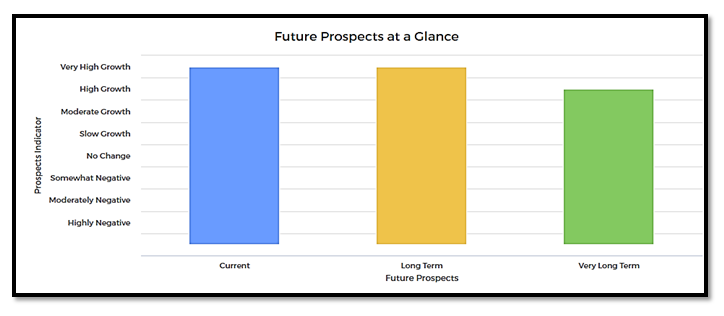
Future Prospect At A Glance
Current (0-1 year) | Long Term (2-5 year) | Very Long Term (6-10 years) |
Very High Growth | Very High Growth | High Growth |

